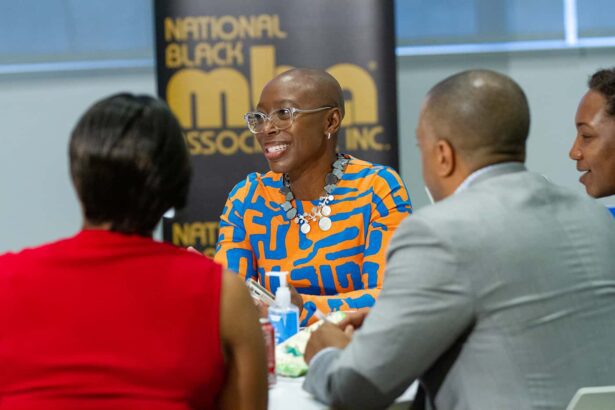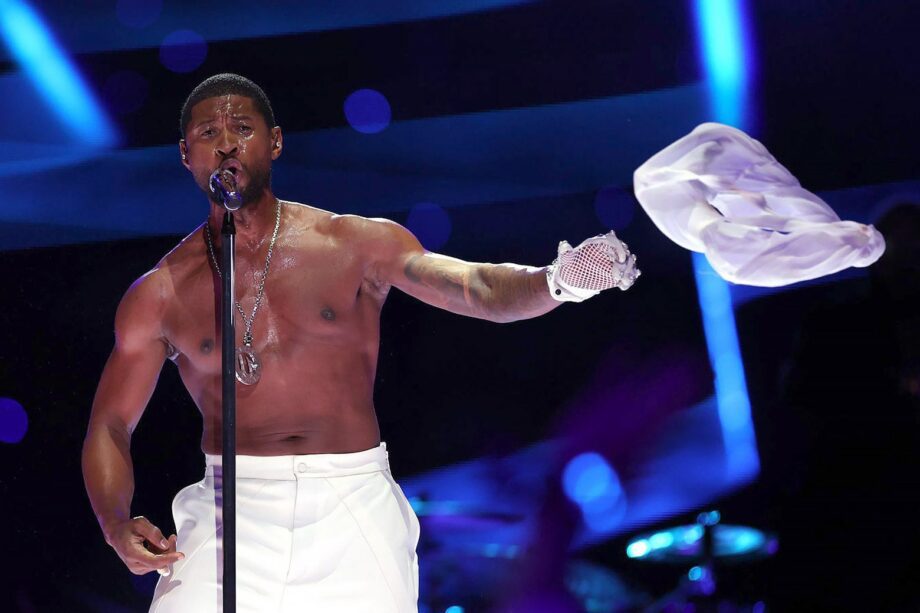Coming off an impressive 100-show Las Vegas residency and the Friday release of his new album Coming Home, Usher finally stepped up to the main stage on Sunday for his long-awaited Super Bowl LVIII halftime performance. It’s been three decades since Usher’s self-titled debut album, and after a lifetime of hitmaking with the biggest and best in the industry, the world was waiting to see not only which songs the R&B legend would perform but also what special guests he would bring out.
The Atlanta-raised crooner promised Vogue that R&B would “take the main stage,” and it was a given that, at the very least, he would bring out the collaborators of his most popular hit, “Yeah!,” Lil Jon and Ludacris.* But that didn’t stop fans from speculating about his other, yet-to-be-revealed guests: Would they include the Grammys’ most recent Best New Artist, Victoria Monét? Would Usher give Janet Jackson a moment of redemption? Or, maybe, considering the fact that Taylor Swift would be in attendance to support her beau—Kansas City Chiefs tight end Travis Kelce—would the country-pop princess hop onstage for a genre crossover? But the potential guest that had everyone hopeful was Usher’s protégé Justin Bieber, whom Usher famously ushered from YouTube virality to pop stardom; in fact, TMZ even reported that the two were in talks for a special tag-team moment during the big game.
To the disappointment of Beliebers everywhere, that special reunion didn’t end up materializing. Instead, true to his word, Usher served us a glorious night of R&B, with special appearances from H.E.R. for “Bad Girl” and, naturally, Alicia Keys for “My Boo.” Of course, Lil Jon and Ludacris popped up for “Yeah!”; Jermaine Dupri—Usher’s mentor and legendary R&B and hip-hop producer—had his moment in the spotlight; Black Eyed Pea Will.i.am joined for “OMG.”
As it turns out, the lack of the Biebz left room for something much more meaningful on Sunday night: a beautiful showcase of some major touchstones within Black music and culture—specifically the Black Atlantan scene of the early 2000s. With the exception of the circus-themed spectacular—complete with a dancer on stilts—that opened it, the 13-minute show felt like something straight out of an Atlanta nightclub. After Usher’s electric embrace with Keys, the performance turned into something reminiscent of a campus house party. There were dancers doing movements inspired by Black collegiate life—like the popular shoulder-shimmying dance known as strolling, with canes that the members of the Black fraternity Kappa Alpha Psi are known for—and marching bands spelling out Usher’s name on the field. Sure, Black Greek life and marching bands have a large influence at historically Black colleges and universities across the country, but the South, specifically Atlanta, is known for its homecomings being the hotbed of Black Greek culture and a premier stage for extravagant marching band performances. In fact, there’s even a 2002 movie about this particular spectacle of Atlantan university culture: Drumline, starring Nick Cannon.
Usher then doubled the Southern trouble with other references to life in his hometown, including pole dancers in the background as a nod to the historic Atlanta strip-club scene, as well as an exciting moment of Usher rollerblading alongside a group of background dancers on skates doing tricks. Roller rinks are an important part of Atlantan culture, perhaps captured most by the 2006 film ATL, a coming-of-age movie starring rapper T.I., in which the action is centered on the local roller-skating rink.
By the final song—a perfect rendition of “Yeah!,” delivered alongside Lil Jon and Ludacris—the singer had taken us on what felt like a journey through different realms both fantastic and more down-to-earth, from the circus to the club to even, dare I say, the world of Tron, when he popped up in a sparkly, futuristic blue-and-black Teenage Mutant Ninja Turtles–esque outfit that showed off his abs. But even more fittingly, Usher pulled off his grand feat of taking “the world to the A,” as he chanted onstage—a moving homage to his musical and geographic roots, as sentimental as it was boppin’.
Correction, Feb. 13, 2024: This piece originally misstated that Usher was born in Atlanta.




